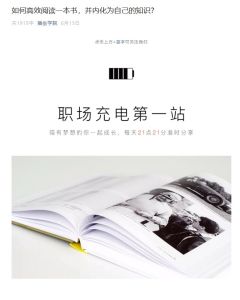Join getAbstract to access the summary!

Join getAbstract to access the summary!
Liang Shuang
What’s the Best Way to Read a Book?
Cha Zuo MBA, 2018
What's inside?
Try these four tips on how to remember what you just read.
Recommendation
Many readers struggle to make information stick once they finish reading a book or a long-form article. As any student can attest, you can absorb only some of what you read. Once you’ve finished the book, you immediately start forgetting what you learned. The new pieces of information the Internet continuously hurls at you – along with other modern-day distractions – make it even harder to preserve your memory. Book lover Liang Shuang, who contributes to Cha Zuo MBA – a Wechat wemedia account that offers career advice – tackled the challenge and adopted new reading habits that help him remember and apply what he reads. In this post, he shares four tips to help fellow readers do the same. getAbstract recommends this article to readers who want to learn more and use their time more efficiently.
Summary
About the Author
Liang Shuang is a writer for Cha Zuo MBA, a WeChat wemedia account focused on career advice, workplace acumen and China’s job market.


















Comment on this summary